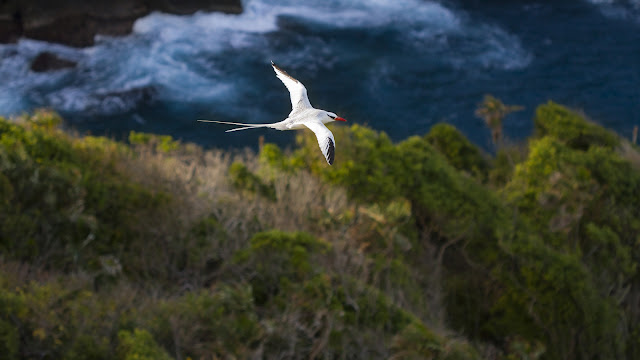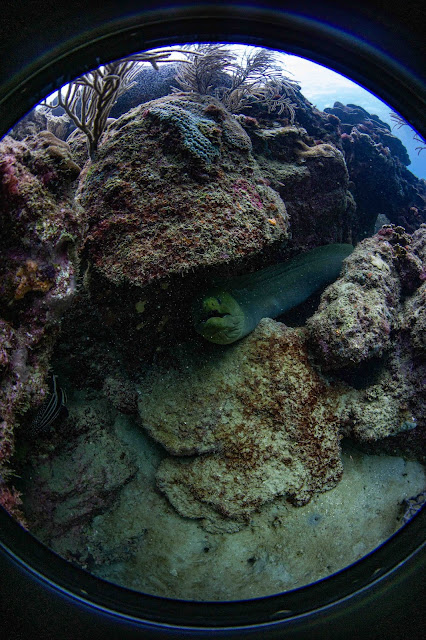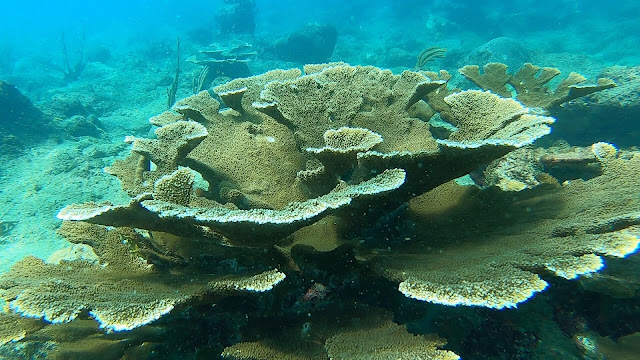Sharks and Coral Reefs
Dr Anjani Ganase looks at the web of life
that connects sharks to healthy coral reefs. The relationship is both intimate
and ecological; with as profound an effect on human life as keeping Campy the
sabre-winged hummingbird in the Main Ridge rainforest.
Over the last fifty years,
shark populations have plummeted worldwide. The most recent study of sharks
decline was tracked through the Queensland (Australia) shark control programme,
where netted drumlines were draped along more than 1000 km of the Queensland
coastline adjacent to the largest barrier reef in the world to protect humans
from shark attacks. Over the last 55 years, since its inception in 1962, the
shark populations have dropped by 70 – 90 % depending on the species of the
shark. Parallel to the decline in numbers, shark samples in later years were
also smaller in size. Essentially the nets reflect the exploitation of sharks
over five decades from regional fishing pressures, apart from the devastating
impacts of the drumlines. Common shark species decimated include both the large
apex predators such as Tiger sharks, Hammerhead and White Sharks but also reef
sharks such as Grey Whalers and smaller species (Roff et al 2018). About 45 shark
species were caught using these nets, despite some species being protected –
White Sharks – as a result of this “control” programme.
Here in the Caribbean and
Trinidad and Tobago, sharks have also been exploited for generations,
especially after the advent of industrialised fishing practices. Today, sharks
are hardly encountered on coral reefs of the Caribbean. In 2013, of the 13
countries that I visited to do reef surveys, I can count on one hand the number
of countries where I encountered sharks; these were along the Mesoamerican barrier
reef, Bahamas and Turks and Caicos. Sharks were most common in marine protected
areas.
Although shark populations
have such a long history of over exploitation and low population numbers –
almost as long as coral reef research has been carried out – it is difficult to
comprehend the importance of sharks to coral reefs. The impacts of loss of
these predators from neighbouring coral reefs are still unclear. There is an
assumption that sharks, as apex predators, are the ultimate controllers of the
trophic structure of other predators and herbivores on coral reefs. However, it
may be more complicated. While there are the large predators – Tiger and
Hammerhead sharks – that may visit reefs from time to time, these predators are
migratory and spend a lot of their time in the open ocean feeding on large
marine animals –turtles, mammals and fish – and roaming a home range of thousands
of kilometres. The resident reef sharks were likely to be meso-predators
(mid-sized predators) that feed on small herbivores and other smaller
predators, and can be fed upon by large apex predators. With a shorter home
range of less than 50 km, it also means that they are more at risk of over
exploitation on specific coral reefs.
Previous studies have
attempted to assess remote coral reefs and reef areas that are protected as a
guide. Essentially, coral reefs of the past would be home to large reef sharks that
competed with other large fish, such as Groupers, for food. It is also thought
that the meso-predator sharks, and other fish may have been omnivore feeders,
meaning that they fed on a variety of organisms from multiple food chain
(trophic) levels - small predators but also herbivores. Our notion of sharks
being the ultimate predators likely stemmed from our observations of an already
exploited reef system with limited predator fish communities. The oversimplified
food chain imagines a reef where large sharks feed on smaller predator fish and
would relieve smaller herbivores from the predation pressures. In return, the
higher abundance of herbivores would assist coral recruitment as herbivores
graze on the macroalgae, a major competitor to corals. This is likely flawed; a
more stable version might be the complex food web of coral reefs, where
predation pressures are diffused among multiple species and there is redundancy
with multiple species among trophic levels. This makes sense as coral reefs
have such high biodiversity. The exploitation of sharks would not necessarily
impact one specific population. On shark-depleted coral reefs, previous studies
have shown equal proportions of other predators and herbivores, moderated by
competitors of sharks (Roff et al 2016).
Nonetheless sharks still serve
important ecological roles on coral reefs through nutrient cycling, and the
exportation of nutrients between reef and the neighbouring pelagic waters.
Sharks are also scavengers that feed on the disabled or diseased (Roff et al
2016).
 |
Blacktip sharks on
coral reefs in the Red Sea. Credit: Warren Baverstock, Coral Reef Image Bank.
IYOR 2018.
|
How
do coral reefs help sharks?
The diverse reef types and
structure are associated with an array of shark species, that utilise the
spaces on the reef as refuge during their juvenile stages or even to relax
before hunting in the night. During the day, it would not be uncommon to find a
large shark tail poking out from under a coral outcrop where the shark is
having a daytime nap. Sharks like other large fish take advantage of the
cleaning stations on coral reefs for the removal of parasites. They also gather
where currents concentrate off the reef edge to ventilate their gills.
Therefore the loss of coral structure from bleaching or hurricanes will also have
an impact on shark populations.
What
does this mean to us?
It is equally important to
protect the organism and the ecosystem it utilises. Designating protected coral
reef areas will give sharks as well as other larger fish species the chance to
recuperate. This will benefit our fisheries through overflow numbers; it will
also protect our coastline through marine protected zonation. In the Caribbean
and even in Australia, a lot of work in conservation and education still needs
to be done for people to understand how we benefit from both healthy
populations of sharks and coral reefs.
References:
Roff G, Doropoulos C, Rogers
A, Bozec YM, Krueck NC, Aurellado E, Priest M, Birrell C, Mumby PJ. The
ecological role of sharks on coral reefs. Trends in ecology & evolution.
2016 May 1;31(5):395-407.
Roff G, Brown CJ, Priest MA,
Mumby PJ. Decline of coastal apex shark populations over the past half century.
Communications biology. 2018 Dec 13;1(1):223.



